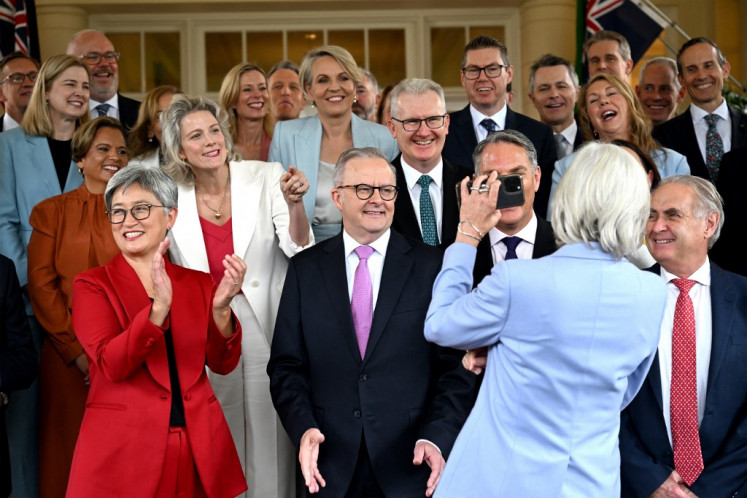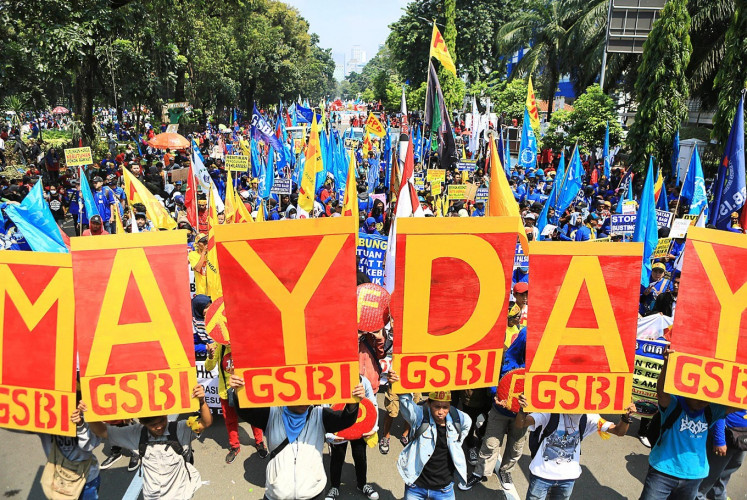Idul Fitri: Liberation and social reconciliation
On Idul Fitri, Muslims always say “Mohon maaf lahir batin”; which literally means “I wholeheartedly ask you for forgiveness”
Change text size
Gift Premium Articles
to Anyone

O
n Idul Fitri, Muslims always say “Mohon maaf lahir batin”; which literally means “I wholeheartedly ask you for forgiveness”.
Expressing this to beloved parents, families, friends, colleagues and fellow citizens is religiously meaningful for Muslims. It is a reflection of happiness and a manifestation of personal and social reconciliation, as their hearts and souls are ready to ask for forgiveness to others. According to Islam, forgiveness reflects a noble character
and is strongly recommended (Koran 7:199).
While receiving text messages with Idul Fitri greetings from colleagues back in Indonesia, I was recently touched by messages sent by Christian colleagues. Apart from passing on good wishes to me, they informed me of the difficulties facing Christian communities in professing their faith in several cities.
Their churches have been sealed by local administrations due to protests from militant groups and that their priests received threats.
Meanwhile, members of the Shiite community in Sampang, Madura, who also sent me Idul Fitri greetings, asked me to support their requests for the temporary release of their leader, Tajul Muluk, who was sentenced to two years in jail after conservative clerics and the local authorities declared that Shiite Islam deviant and against Islam. Muluk is a Muslim and must wish to celebrate Idul Fitri with his family at home.
All those greetings and messages raise a question about the meaning of Idul Fitri for my fellow Muslims. Is it possible for us to celebrate the holiday with a spirit of liberation and social reconciliation? If we are committed to Islam as a religion of peace and rahmatan lil alamin (blessings of all human beings), such spirits are religiously justified.
Theologically, Idul Fitri can not be separated from Ramadhan. It would be a mistake to separate them. As fasting during Ramadhan is compulsory for Muslims, God also encourages them to intensify their worship and to be muttaquun, or conscious of God (Koran 2: 283).
They are also motivated to conduct activities such as reciting the Koran, gathering for tarawih prayers, paying zakat (alms), among other things. Thus, Ramadhan is a month of mercy and blessings, and Muslims will be rewarded for their good deeds, forgiven for their sins and freed from the threat of the hell (Hadist).
Imam Al Ghazali, the great Muslim scholar and sufi in Ihya Ulumuddin urged Muslims to achieve the highest level of Ramadhan. Accordingly, Muslims should practice tazkiyatun nafs, or purifying their hearts and souls from misconduct. It aims to control lust and elements of the human ego such as sexual desire, greed, stinginess, arrogance, repression and other uncivilized actions.
It is also a liberation process of life toward respect for human dignity, justice and tolerance to all people. God will reward those who are able to conduct tazkiyatun nafs in the form of fitrah by being reborn in a new life at the end of Ramadhan and by celebrating Idul Fitri happily.
We may observe Idul Fitri happily this year, but we should remember those who are unable to celebrate the holiday due to a loss of freedom. Such a display of solidarity and empathy is in line with Islam as a religion of peace and tolerance. Muslims have to show a “friendly Islam”, but in reality we are now facing the growing influence of “angry Islam” expressed by militants who are threatening Indonesia’s democracy and religious freedom.
Indeed, our leaders used to claim that Indonesia’s democracy and religious freedom were progressing. However, surveys conducted by local and international human rights institutions show that Indonesia’s democracy and religious freedom have been declining.
Miserably, our leaders are unable to control the growing influence of militants, who often perpetrate acts of violence against religious minority groups, including Ahmadiyah members who are unable to worship at their mosques until today.
The Setara Institute reported there were 299 violent incidents related to religious freedom in 2011. It comes as no surprise that on May 23, the UN Human Rights Commission in Geneva urged the Indonesian government to investigate the rampant attacks on religious minorities.
Likewise, Jennie S. Bev, a noted columnist and human rights advocate, wrote in Strategic Review that Indonesia’s central and local governments are unable and unwilling to protect religious minorities and succumb to the pressure of the Islamic hard-liners.
Based on her observation, there is a “politics of holier than thou”; referring to the behavior, reactions and inactions of the country’s politicians to the religious persecution in Indonesia.
To celebrate Idul Fitri this year, it would be wise and meaningful if our leaders contemplate what they have done in maintaining democracy and religious freedom.
They should also ask for forgiveness from the religious minorities who have lost their freedom and opportunities to worship. Idul Fitri should mark the start of efforts to build a better, democratic and peaceful Indonesia. Happy Idul Fitri!
The writer is a former senior research fellow at Harvard Kennedy School in the US and is currently an associate professor at Universiti Utara Malaysia (UUM) in Kedah, Malaysia.









